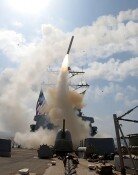[Editorial] Base Relocation Protests Are Irresponsible
[Editorial] Base Relocation Protests Are Irresponsible
Posted December. 12, 2005 08:20,
Yesterday, there were demonstrations opposing the relocation of American bases in Pyongtaek, Gyeonggi Province. About 4,500 civic groups, workers, farmers and students participated in the demonstrations staged by the Korean Front to Stop the Expansion of U.S. Bases in Pyongtaek.
The Yongsan garrision is supposed to relocate until late 2007 to Pyongtaek, and afterwards, the U.S. 2nd Infantry Division, deployed north of Seoul, will follow suit. It is worrisome in the aspect of national interest and security that with the agreement between the Korean and U.S. government concluded, and the land bought, such an ideological and political demonstration would be held.
The relocation of American bases to Pyongtaek has been recognized as a symbolic landmark of the ROK-U.S. alliance after the inauguration of the Roh Moo-hyun administration. Under the slogan of Cooperative Self-reliant Defense, whenever there were voices pointing out problems in the alliance, both Korean and U.S. authorities emphasized the agreement reached at Pyongtaek. It is the common perception of experts from both countries that ROK-U.S. relations will in fact plunge into a crisis if the Pyongtaek agreement is broken as well.
Organizations opposing the relocation claim baseless arguments by inciting local residents that the U.S. base in Pyongtaek is intended for a pre-emptive strike against North Korea and an outpost for foreign invasions. For them, who have demanded the closure of the Yongsan garrison and obtained it, opposing the Yongsan garrisons move to Pyongtaek is the same as demanding the USFK withdraw from the Korean Peninsula. If that actually occurs, how will the security vacuum be filled, and how will the blueprint of the security of Korea, without an ally, be drawn? This is the reason why their arguments are seen as irresponsible anti-Americanism without any alternatives.
Last month, the government decided to forcibly expropriate 910,000-pyong of land, which could not be bought, out of the total 3.49 million pyong where the new U.S. base will be built. It also announced a Pyongtaek development plan where it would invest 18 trillion won until 2020. Nonetheless, the government should be more proactive. It should show more efforts to persuade the inevitability of U.S. base relocation to Pyongtaek residents and refute the logic of those opposing it. Only by doing so will the ROK-U.S. alliance be protected and avoid the mistake of making Pyongtaek a second Buan.







